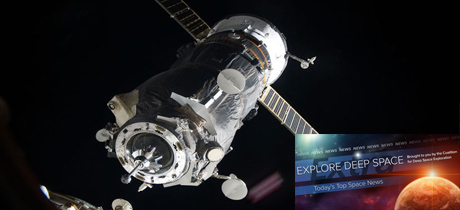In Today’s Deep Space Extra… U.S., Russian and Japanese astronauts arrive at the International Space Station. President Trump says U.S. space industry will play a significant role in national security strategy. Re-established White House National Space Council seeks experts for advisory panels.
Human Space Exploration
U.S., Russian, Japanese crew arrive at Space Station
Reuters (12/19): Russia’s MS-07 spacecraft with U.S., Russian and Japanese astronauts Scott Tingle, Anton Shkaplerov and Norishige Kanai docked with the International Space Station on Tuesday at 3:39 a.m., EST, two days after launching from the Baikonur Cosmodrome in Kazakhstan. They were greeted by station commander Alexander Misurkin, of Russia, and NASA’s Mark Vande Hei and Joe Acaba. The new members of the station crew are to remain aboard until early June.
The Space Review (12/18): President Trump’s call for the U.S. to lead the way back to the lunar surface with human explorers, including commercial and international partners, generated a chorus of support from key members of Congress, the private sector and the recently re-established White House National Space Council. Will his directive have more staying power than those of similar calls issued by former presidents George H. W. Bush and George W. Bush in 1989 and 2004? Jeff Foust, the TSR’s editor, notes that familiar questions over budget and strategies remain. The president’s 2019 budget proposal, expected in February, should hold some answers.
Space Science
The search for life on Mars should go underground, scientists say
Space.com (12/18): A research team suggests that scientists not assume that a search for life on Mars should follow the assumptions for finding life on Earth. Mars, which is less massive than the Earth and more distant from the sun, appears to have lost its warmer, wetter environment, perhaps 4 billion years ago. That’s about when life on Earth was getting a foothold. The study Perspectives was published in the journal Nature GeoScience.
Our first interstellar visitor may be a camouflaged comet
Science News (12/18): Oumuamua, the interstellar object discovered moving through the solar system in October, may be a dormant comet and not at all rocky as first thought, according to new scientific speculation published in the journal Nature Astronomy.
NASA planning to purchase Earth science data from commercial smallsat systems
Space News (12/15): After a delay, NASA intends to forge ahead with plans to commercially purchase Earth science data. The agency issued a request for information to the commercial sector earlier this month to see who might be interested in becoming a provider.
Other News
Space industry takes prominent role in Trump’s national security strategy
Space News (12/18): A growing U.S. commercial space sector represents a national security priority, President Trump said Monday as part of his 2017 National Security Strategy, which overall is intended to preserve the nation’s standing among global rivals that include China and Russia. The responsibility for advancing the security strategy elements will fall to the recently re-established White House National Space Council.
Nominations open for Space Council’s Users’ Advisory Group
Spacepolicyonline.com (12/18): Scott Pace, executive secretary of the recently re-established White House National Space Council, is seeking 20-25 experts in aeronautical and space activities to serve on the council’s space advisory panels, plus other experts. Applicants must be U.S. citizens and not a regular federal employee.
Paul Allen’s Stratolaunch space venture puts monster plane through first taxi test
GeekWire (12/18): Stratolaunch’s large flying launch pad carried out its first runway taxi test at Edwards Air Force Base, California, over the weekend, the company announced on Monday. With its distinctive dual fuselage, 385-foot wingspan and a nickname of “Roc,” the aircraft is designed to carry at least one rocket launcher and payload into the air for release and launch.
Colorado’s largest private company now owned by Texas firm
Coalition Member in the News: Jacobs
Denver Business Journal (12/18): CH2M, which had been Colorado’s largest privately held company, is now officially part of Jacobs Engineering Group Inc, a Dallas public company.
Jacobs Engineering Group Inc. (NYSE: JEC) said it was buying CH2M in a $3.27 billion deal, including cash, stock and debt, back in August. As of Monday, the purchase became official, creating a $15 billion global entity that will focus on government, infrastructure and industrial professional services; 96 percent of CH2M’s shareholders approved the deal.

